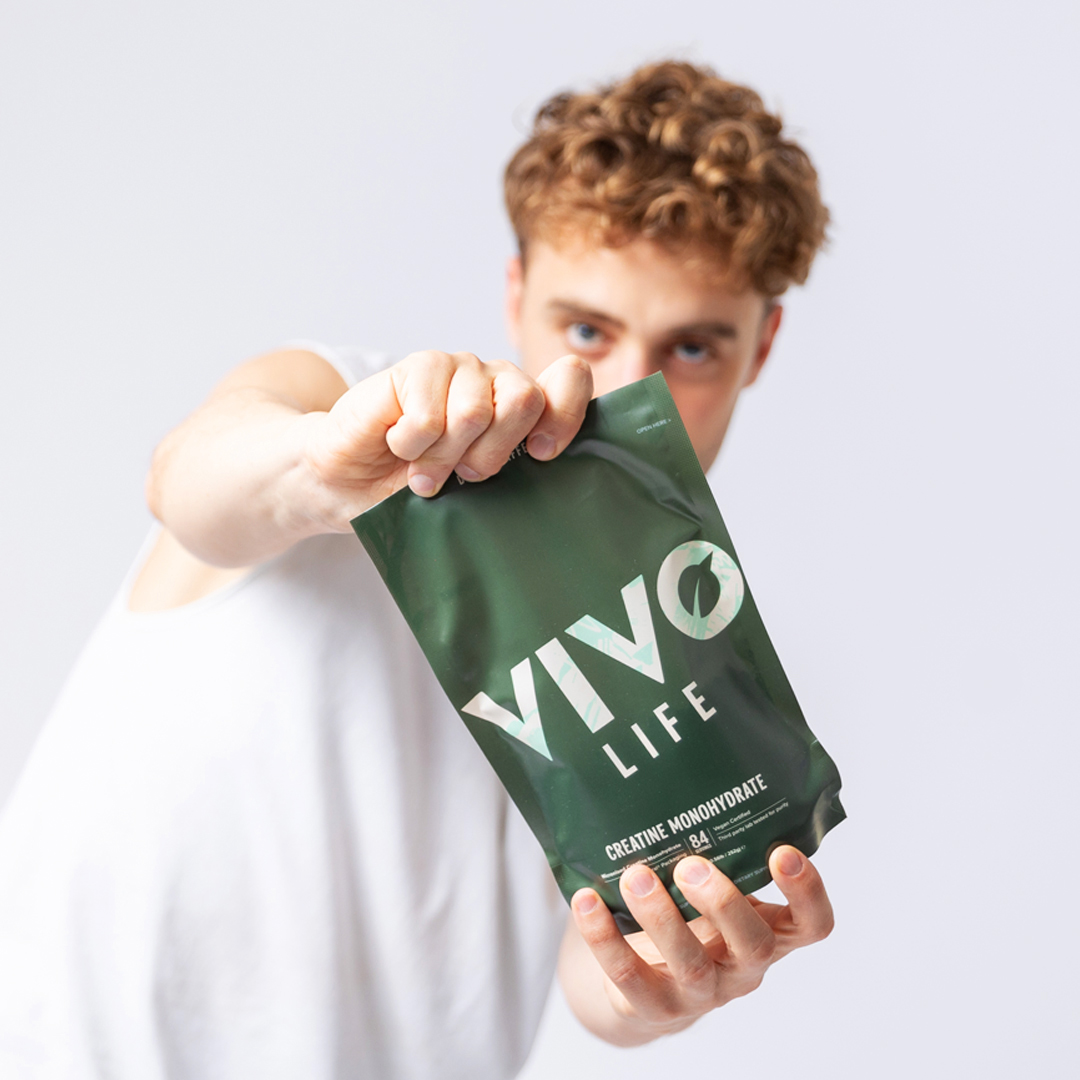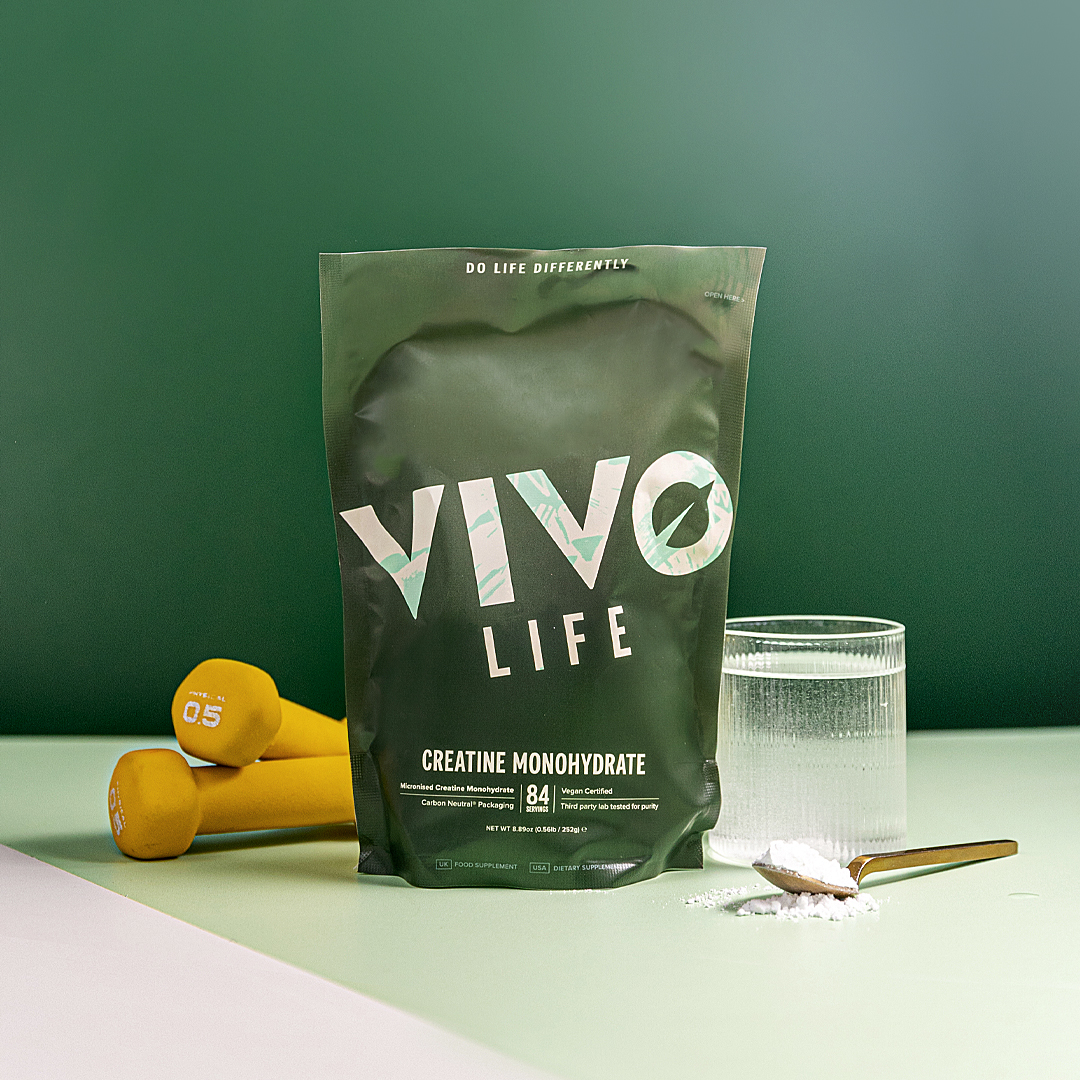CREATINE
Updated
by Kat Hoyle
Creatine is a sports performance focused supplement that can help improve strength and power output during explosive exercise.
Our creatine is ultra-pure, micronized creatine monohydrate. This means we have taken particular care to source a well-produced and high-quality creatine, in comparison to some lower quality options on the market. Creatine Monohydrate is the most popular and well researched type of creatine available. “Monohydrate” refers to the way this form of creatine is made using water, making this one of the purest forms of creatine. “Micronized” refers to the ultra-small particles which are more water soluble, making this form of creatine most easily absorbed by the body. Creatine is the most well researched supplement on the planet and with appropriate dosage it is safe and effective.

So what exactly is creatine? Creatine is a naturally occurring organic compound produced by our bodies, primarily in our livers but secondarily in our kidneys and the pancreas. Creatine is the main proponent of one the bodies major energy systems, the ATP-Phosphocreatine system. This energy system is fast acting, explosive and will mainly be utilized in high intensity, explosive and/or strength exercise/movement patterns.
What role does creatine play in energy release? Adenosine triphosphate (three phosphates) or ATP is the main energy currency of our bodies, it is essential for all our bodily functions, cellular processes and of course movement. It is created intracellularly in the mitochondria and stored in our cells thereafter. Different types of movement and exercise will elicit ATP release in different ways, according to the intensity of the movement. To release this stored energy a catabolic reaction occurs to break one of the three phosphates away from the ATP molecule, known as hydrolysis. Energy is released as a result of this reaction, and we are left with Adenosine diphosphate, ADP (two phosphates). In the circumstance of intense and/or explosive movement (think weightlifting, plyometrics, sprinting), the leftover ADP can then be recycled back into ATP using intramuscular stored phosphocreatine. This is known as the ATP-Phosphocreatine system (ATP-PCr) or the Phosphagen energy system, producing ATP anaerobically (without O2) and fueling the first few moments of an explosive action. The phosphate molecule binds to the ADP, returning the missing phosphate and creating ATP once again. It is estimated that on average a person synthesizes around 1 gram of creatine per day naturally, which is stored ready to be used as needed. However, the PCr energy system will expend once intramuscularly stored creatine has depleted.
What benefit does creatine supplementation have? Once our intramuscularly stored creatine has depleted our bodies will need around 5 minutes to restore to resting levels. This is quite a while when we consider activities like weightlifting or powerlifting, where we need to repeatedly exert a large force. By supplementing with creatine, we increase our intramuscular stores which can help us to maximize the initial ATP-PCr energy system, extending its response. This has many practical implications.
Creatine can optimize power output. There is a healthy amount of supporting evidence to show that creatine supplementation can increase power output, particularly for power, strength, and sprint athletes. A meta-analysis (an analysis of multiple studies results) of studies exploring the effect of creatine supplementation on power output and strength. The bench press and squat strength was measured with and without a creatine supplementation intervention, at a 1-3 rep range (to ensure PCr system was dominant). The creatine groups demonstrated a 6.85kg average increase in bench press and a 9.76 average increase in squat strength across the study. A second meta-analysis explored potential differences in creatine supplementation benefit between males and females and trained and untrained individuals. They found no significant difference meaning that the benefits of creatine supplementation can be experienced by all. This positive effect on power output can equate to muscular strength and hypertrophic gains (muscular size growth).
Creatine can improve muscular strength and encourage hypertrophy. If creatine supplementation can improve power output, then this increase in power can lead to more muscular work during exercise and in turn increased muscular strength and hypertrophic gains. This is particularly beneficial to strength athletes, weightlifters, powerlifters, body builders etc. It goes without saying that if you have an increase power output, and more work done during your workouts, that (coupled with appropriate nutrition and recovery) you are likely to experience some strength and hypertrophic gains due to the natural adaptation of muscle protein synthesis that occurs in response to resistance training. Creatine supplementation can also have a positive effect on muscle size independent to muscle protein synthesis, as it can increase water retention in muscle fibers which increases their diameter and mass. One study observed that a 10-day creatine supplementation intervention could increase muscle cellular osmolality (water retention) and in turn muscle fiber diameter by 9%, 5 % and 4% respectively.
Does creatine have any negative side effects? Creatine is one of the most researched supplements and with correct usage is generally considered very safe. There has been some speculation that creatine could contribute to male pattern hair loss, however studies have failed to demonstrate actual causation and it remains unproven. The association stems from creatines potential effect on hormones that are involved with male pattern hair loss, as creatine can affect levels of DHT hormone. More research is needed but a precautionary action is that men who have male pattern baldness in their family should research further before supplementing with creatine or avoid supplementation all together.
Supplementing guidelines. Historically a “loading phase” was the trend with creatine supplementation, but the research has evolved to show that this has little benefit and that a daily dose of between 3-5g is optimal to obtain the benefits over time. Research has also shown that taking creatine around the time you work out (before, during or after) can best optimize the benefits as it can maximize intramuscular creatine uptake. On resting days, it can be taken at any time of day. Creatine is suitable for males and females, and from athletes to more casual exercisers.
Added benefits of creatine supplementation. Creatine supplementation can have some extra benefits to cognitive performance for vegetarians and vegans, who do not have any dietary creatine intake due to not consuming animal products. A study found that a creatine supplement intervention in omnivores and vegetarians/vegans showed improvements in cognitive function (memory, learning and performance) in the latter group, but no significant improvements in the omnivorous group. This could demonstrate an extra benefit for vegetarians/vegans of creatine supplementation.
How to supplement with creatine. Creatine is a fairly tasteless white powder, so can be added to pre-workouts, or juices if you would like to add flavor. It can be drunk on its own with water and will have a mildly detectable taste. Use 3-5g per day, near to your workout time on training days, or at any time on rest days is sufficient to experience benefits over time. Creatine takes a little while to take effect, around 28 days for your intramuscular stores to increase.
Like all our products our creatine is routinely tested for heavy metals by ourselves via third party laboratories. World renowned testing laboratory Labdoor also independently tested our creatine, you can check out their results here.

Frequently Asked Questions.
- Is Creatine safe?
Yes! Creatine is one of the most comprehensively studied supplements on the planet and is proven safe for long term use. According to meta-analyses by the International Society of Sports Nutrition creatine is one of the few supplements on the market with an ‘outstanding safety profile.’ Our creatine is third party tested for heavy metals, banned substances and over 500 different herbicides and pesticides.
- When is the best time to take Creatine?
The evidence on creatine timing is currently mixed, however research suggests that the optimum time to take creatine is before or after a workout. The theory is that this helps to maximise the uptake of creatine into the muscle cells. The time of day that you take creatine is not super important, the most important thing is that you take it consistently if you are to feel the benefit!
- Do I need to do a ‘loading phase’?
The evidence suggests that there are little benefits in doing a ‘loading phase’ of creatine (consuming a high dose of creatine for 5-7 days followed by a lower maintenance dose). All of the evidence shows that a normal maintenance dose of 3 – 5g per day is the maximum needed to elicit benefits over time.
- Will Creatine cause me to gain weight?
The first week of creatine supplementation can cause an increase in weight, but only due to more water being stored in the muscles. From that point creatine can assist with muscle gain, but only with the proper training and nutrition protocol. Without the proper training stimulus creatine will not contribute to weight or muscle gain.
- What is micronized Creatine?
Micronized creatine has particles that are 20 times smaller than regular creatine. This provides a greater uptake into the muscles, and also makes it less likely to clump when drinking.
- Should I only take Creatine on training days?
For best results we recommend taking creatine on both training and rest days. This helps to make sure that your creatine stores remain elevated.
- Does Creatine cause dehydration?
Evidence shows that creatine may actually prevent dehydration in athletes by drawing more water into cells (Greenwood et al. 2003; Dalbo et al., 2008). However when taking creatine it is recommended that you consume a minimum of 3 – 4 litres of water per day.
- What is the recommended dose of Creatine?
Our recommended creatine dose is 3-5 grams, 1-2 times a day. 3g is pretty much a rounded teaspoon but if you like to be exact then we suggest you weigh the amount.
- How many servings are there in a pouch?
There are 84 servings per pouch based on a 3g per day serving. The pouch weighs 252g.
- How is your Creatine sourced?
Our Creatine Monohydrate is suitable for vegans as the raw materials used for the production of the supplement have absolutely no animal origin in them.
- How does Creatine work?
Creatine is a naturally occurring amino acid that is made by our bodies and stored in our muscles. Its main function is to enhance our bodies natural energy currency (ATP) and is especially beneficial for those partaking in high intensity exercise where quick bursts of energy are needed.
References
Adeel Safdar, Nicholas J Yardley, Rodney Snow, Simon Melov, Mark A Tarnopolsky. (2008). Global and targeted gene expression and protein content in skeletal muscle of young men following short-term creatine monohydrate supplementation. Physiological Genomics. 32 (2), 219-228.
J David Branch. (2003). Effect of creatine supplementation on body composition and performance: a meta-analysis. International Journal of Sport Nutrition and Exercise Metabolism. 13 (2), 198-226.
J S Volek, N D Duncan, S A Mazzetti, R S Staron, M Putukian, A L Gómez, D R Pearson, W J Fink, W J Kraemer. (1991). Performance and muscle fiber adaptations to creatine supplementation and heavy resistance training. Medicine and Science in Sport and Exercise. 8 (3), 1147-1156.
Kelly, VG and Jenkins, DG (1998). Effect of oral creatine supplementation on near-maximal strength and repeated sets of high-intensity bench press exercise. Journal of Strength And Conditioning Research 12 (2) 109-115.
M D Becque , J D Lochmann, D R Melrose. (2000). Effects of oral creatine supplementation on muscular strength and body composition. Medicine and Science in Sport and Exercise. 32 (3), 654-658.
Rania L Dempsey, Michael F Mazzone, Linda N Meurer. (2002). Does oral creatine supplementation improve strength? A meta-analysis. The Journal of Family Practise. 51 (11), 945-951.
